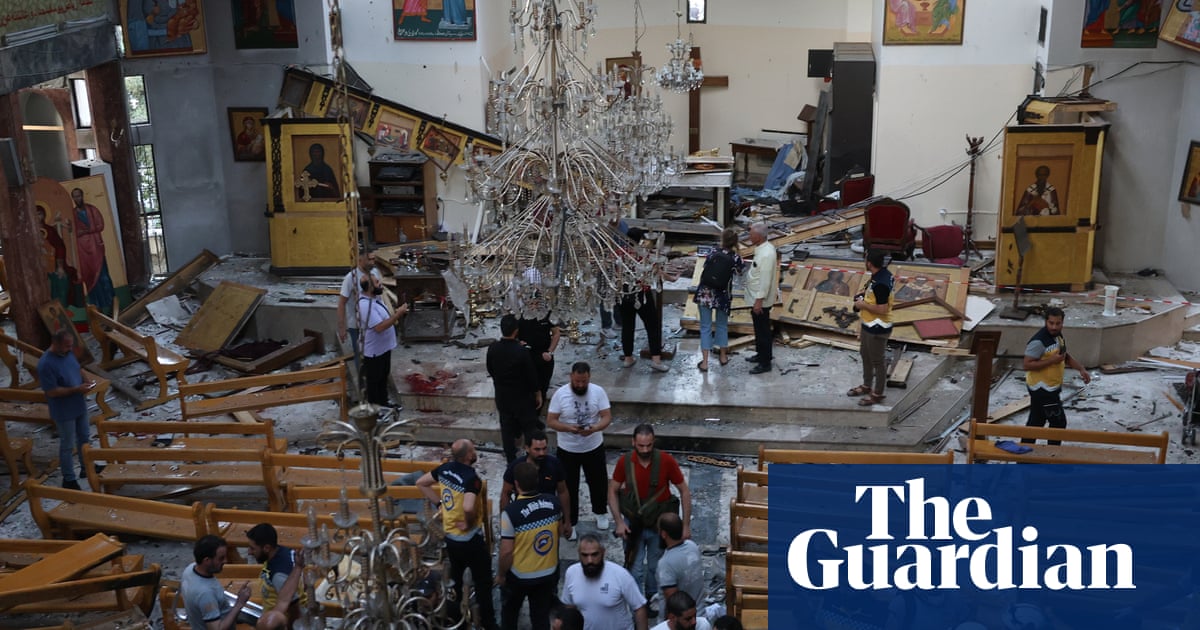A suicide bombing byIslamic State(IS) targeting a church in Damascus has killed 20 people and wounded 52, Syrian authorities have said.
The attack on Sunday night was the first major IS operation and the first suicide bombing in Syria since former Syrian president Bashar al-Assad was toppled in December and replaced by an Islamist-led government.
A man affiliated with IS entered the Greek Orthodox Saint Elias church in the old Christian quarter of Damascus during prayers, opened fire and then detonated an explosive vest while inside the church, Syria’s interior ministry said. Eyewitnesses inside the church reported a second gunman who did not blow himself up, but also shot at the 150 or so worshippers present.
Videos of the church’s interior show splintered pews overturned by the force of the blast and the bloodied corpses of congregants splayed out across the church. Nearby residents reported hearing a large blast and then the sound of sirens as security forces attempted to establish a cordon around the area and civil defence personnel headed towards the church.
The attack came after months of low-level IS activity and propaganda, as the group attempted to exploit the security vacuum created after the fall of Assad to reconstitute itself. Syrian officials have said the group was able to seize weaponry and ammunition left by fleeing Assad regime soldiers to bolster its caches.
The Syrian government, led by former leaders of the Islamist rebel group Hayat Tahrir al-Sham (HTS), have been carrying out anti-IS raids throughout the country since taking power. While still a rebel group, HTS had been fighting IS in areas under its control, viewing it as a source of instability and radicalisation for rival rebel groups.
Since the fall of the Assad regime, IS has attempted to use the apparent moderation of the former Islamist rebels who now lead the country as a recruitment tool for disaffected Islamist fighters.
IS social media channels and propaganda published pictures of the Syrian president, Ahmed al-Sharaa, meeting the US president, Donald Trump, in Riyadh in May, describing it as an apparent betrayal of his jihadist roots.
Syrian authorities have stressed religious minorities will be protected under their rule. Security personnel usually are posted at each entrance of the city’s Christian quarter, inspecting cars as they come in.
The Syrian minister of information, Hamza al-Mustafa, said: “This cowardly act contradicts the values of citizenship that unite us all. We, as Syrians, emphasise the importance of national unity and civil peace, and call for strengthening the bonds of fraternity between all components of society.”
The Damascus municipality said security services were investigating the circumstances of the bombing.Though nominally in power of most of Syria, the country’s new government has struggled to extend its control on the ground over the country. Syria is still full of militias, some of them more radical than others. The country’s defence ministry is in the process of folding militias into a unified national army and disarming those who refuse to join its ranks.
Since the territorial defeat of the so-called caliphate of IS in Syria, it has been mostly the US-backed, Kurdish-led Syrian Democratic Forces (SDF) that have been leading the anti-IS fight. Cooperation between the SDF and the new Syrian government in fighting IS has been growing but is still in its infancy.The US, as well as the other members of the anti-IS coalition in Iraq and Syria, have cited the resurgence of IS in Syria as one of their key concerns for the country.
